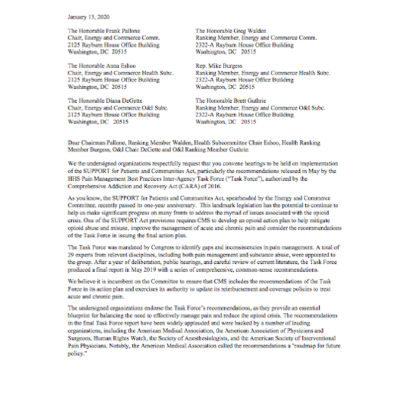 U.S. Pain Foundation recently spearheaded a joint letter to the U.S. House Energy and Commerce (E&C) Committee and the E&C Health and Oversight Subcommittees requesting that they convene a hearing about the pain provisions in the SUPPORT for Patients and Communities Act and the recommendations released in May 2019 by the Department of Health and Human Services Pain Management Best Practices Inter-Agency Task Force. The letter was signed by 30 patient and professional groups.
U.S. Pain Foundation recently spearheaded a joint letter to the U.S. House Energy and Commerce (E&C) Committee and the E&C Health and Oversight Subcommittees requesting that they convene a hearing about the pain provisions in the SUPPORT for Patients and Communities Act and the recommendations released in May 2019 by the Department of Health and Human Services Pain Management Best Practices Inter-Agency Task Force. The letter was signed by 30 patient and professional groups.
The SUPPORT Act directed federal health agencies—including the Center for Medicare and Medicaid Services (CMS), Food & Drug Administration (FDA), and National Institutes of Health (NIH)—to improve access, reimbursement, and research into non-opioid alternatives for acute and chronic pain management. The agencies were tasked with specific deliverables to produce by certain dates.
For example, the FDA was tasked with holding a public meeting and issuing a guidance document to address the challenges and barriers to developing non-addictive medical products to treat acute and chronic pain. CMS was directed to produce an “Action Plan” that included a review of payment and coverage policies that may be obstacles to the effective treatment of acute and chronic pain, as well as opioid use disorder. Not later than one year after enactment, CMS also was directed to conduct the a study analyzing best practices as well as payment and coverage of multidisciplinary, non-opioid treatments for acute and chronic pain.
“In many cases, we are limiting opioids without providing patients viable or affordable alternatives for relief,” says Cindy Steinberg, National Director of Policy and Advocacy. “Federal agencies’ representatives have spoken about wanting to provide safer options for pain. But it is Congress’ responsibility to exercise oversight and ensure that these vital activities are conducted in a timely fashion.”
Likewise, Congress created the Pain Management Best Practices Inter-Agency Task Force and called upon its experts to update best practices for the nation and to make recommendations on how to tackle the harmful and costly consequences of pain. The Task Force’s final report was uniformly applauded by over 150 health-related organizations.
“But these recommendations can’t improve pain care without support and implementation by Congress,” says Steinberg. “It is critical for the appropriate Congressional committees to publicly review these recommendations and prioritize their implementation.”
You can read the letter here. You can also take part in educating your federal lawmakers about the Task Force final report through this action campaign. In addition, if your Congressional representative sits on the House Energy and Commerce Committee, please ask him or her to urge the chairs to schedule a hearing. Look up your representatives’ contact information on our Advocacy homepage.
